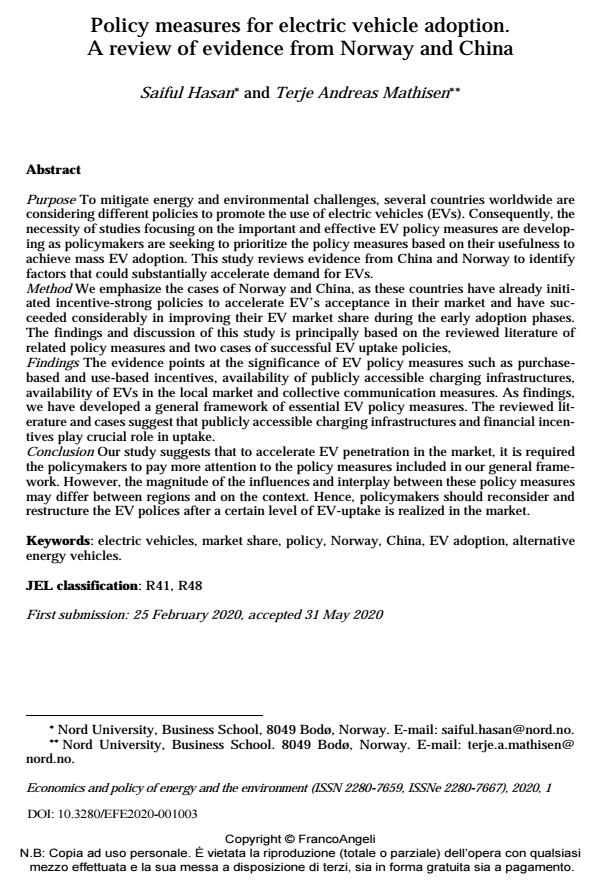Policy measures for electric vehicle adoption. A review of evidence from Norway and China
Titolo Rivista ECONOMICS AND POLICY OF ENERGY AND THE ENVIRONMENT
Autori/Curatori Saiful Hasan, Terje Andreas Mathisen
Anno di pubblicazione 2020 Fascicolo 2020/1
Lingua Inglese Numero pagine 22 P. 25-46 Dimensione file 291 KB
DOI 10.3280/EFE2020-001003
Il DOI è il codice a barre della proprietà intellettuale: per saperne di più
clicca qui
Qui sotto puoi vedere in anteprima la prima pagina di questo articolo.
Se questo articolo ti interessa, lo puoi acquistare (e scaricare in formato pdf) seguendo le facili indicazioni per acquistare il download credit. Acquista Download Credits per scaricare questo Articolo in formato PDF

FrancoAngeli è membro della Publishers International Linking Association, Inc (PILA), associazione indipendente e non profit per facilitare (attraverso i servizi tecnologici implementati da CrossRef.org) l’accesso degli studiosi ai contenuti digitali nelle pubblicazioni professionali e scientifiche.
Purpose To mitigate energy and environmental challenges, several countries worldwide are considering different policies to promote the use of electric vehicles (EVs). Consequently, the necessity of studies focusing on the important and effective EV policy measures are develop-ing as policymakers are seeking to prioritize the policy measures based on their usefulness to achieve mass EV adoption. This study reviews evidence from China and Norway to identify factors that could substantially accelerate demand for EVs. Method We emphasize the cases of Norway and China, as these countries have already initiat-ed incentive-strong policies to accelerate EV’s acceptance in their market and have succeeded considerably in improving their EV market share during the early adoption phases. The find-ings and discussion of this study is principally based on the reviewed literature of related poli-cy measures and two cases of successful EV uptake policies, Findings The evidence points at the significance of EV policy measures such as purchase-based and use-based incentives, availability of publicly accessible charging infrastructures, availability of EVs in the local market and collective communication measures. As findings, we have developed a general framework of essential EV policy measures. The reviewed litera-ture and cases suggest that publicly accessible charging infrastructures and financial incentives play crucial role in uptake. Conclusion Our study suggests that to accelerate EV penetration in the market, it is required the policymakers to pay more attention to the policy measures included in our general frame-work. However, the magnitude of the influences and interplay between these policy measures may differ between regions and on the context. Hence, policymakers should reconsider and restructure the EV polices after a certain level of EV-uptake is realized in the market.
Parole chiave:Electric vehicles, market share, policy, Norway, China, EV adoption, alternative energy vehicles.
Jel codes:R41, R48
- Bridging Policy, Infrastructure, and Innovation: A Causal and Predictive Analysis of Electric Vehicle Integration Across Africa, China, and the EU Nhoyidi Nsan, Chinemerem Obi, Emmanuel Etuk, in Sustainability /2025 pp.5449
DOI: 10.3390/su17125449 - Psychological predictors of intention to purchase a battery electric vehicle: A comparison between Norway and Italy Özlem Simsekoglu, Terje Andreas Mathisen, Giuseppe Marinelli, Mariangela Scorrano, Romeo Danielis, in Transportation Research Interdisciplinary Perspectives 101896/2026 pp.101896
DOI: 10.1016/j.trip.2026.101896 - Evaluating China’s Electric Vehicle Adoption with PESTLE: Stakeholder Perspectives on Sustainability and Adoption Barriers Daniyal Irfan, Xuan Tang, in Sustainability /2025 pp.6258
DOI: 10.3390/su17146258 - Taking the wheel: Systematic review of reviews of policies driving BEV adoption V. Anilan, Akshay Vij, in Transportation Research Part D: Transport and Environment 104424/2024 pp.104424
DOI: 10.1016/j.trd.2024.104424
Saiful Hasan, Terje Andreas Mathisen, Policy measures for electric vehicle adoption. A review of evidence from Norway and China in "ECONOMICS AND POLICY OF ENERGY AND THE ENVIRONMENT" 1/2020, pp 25-46, DOI: 10.3280/EFE2020-001003